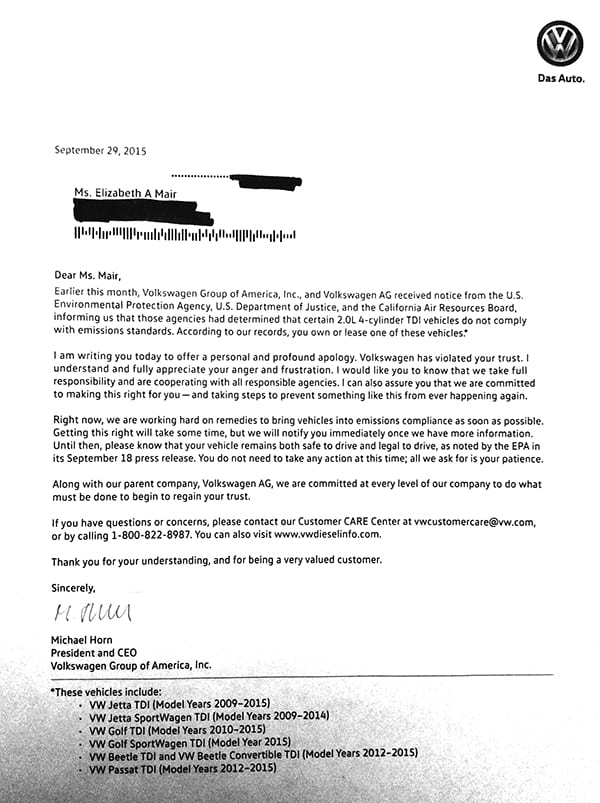 As the owner of a Volkswagen “clean” Jetta TDI who purchased the vehicle in an effort to access great German engineering and ensure more environmental friendliness, all at a good price, I was unnerved when I learned earlier this year that my car was not compliant with emissions standards. As a consumer, I wasn’t 100 percent sure what this meant. As a communicator, I was fascinated to see how VW would handle this—having, of course, a very personal reason to pay close attention.
As the owner of a Volkswagen “clean” Jetta TDI who purchased the vehicle in an effort to access great German engineering and ensure more environmental friendliness, all at a good price, I was unnerved when I learned earlier this year that my car was not compliant with emissions standards. As a consumer, I wasn’t 100 percent sure what this meant. As a communicator, I was fascinated to see how VW would handle this—having, of course, a very personal reason to pay close attention.
Late last month, I received a letter from Volkswagen Group of America, Inc., that offers a glimpse into one thing smart companies can and must do in the worst crisis situations and hopefully at all times: Communicate well with their customers.
Obviously, lawyers and their desire to avoid further legal or regulatory headaches for their clients heavily influence the contents of these letters. Such letters, though, also are exercises in large-scale communication. Often what counsel might put on paper or what a regulator wishes to see will fail to do the job. These types of communication have a huge influence on the fortunes of the affected company for years, so getting them right is important.
My read is that VW did a good job. We have re-printed the full letter here. My summary of what VW did right follows.
- Begin With a Succcint Explanation of the Problem: Yes, this sounds obvious, but it’s important. I know a number of VW owners, including plenty who have read news accounts surrounding the emissions issue fairly closely. Several remained unclear as to whether the illegal software was installed in their vehicles.
Was that situation something consumers themselves could have rectified through better research into the problem? Yes, probably. Was it nonetheless smart to communicate in clear, concise detail exactly what cars were involved since people are people and a lack of clarity was bound to exist? Yes, and that matters in crisis communications.
- Apologize Unreservedly, Personally and Avoid Anything That Could be Construed as Shifting Blame: Since news of the VW situation broke, among car-lover friends and media covering the story, I’ve spotted a few people placing blame in quarters other than VW itself. Undoubtedly there are policy debates that can, and will, be engaged in regarding emissions standards and environmental regulation. That’s fine. But in a letter like this, the president and CEO of VW America was right to simply issue a “personal and profound apology,” note the violation of trust of VW buyers that had occurred, as well as their anger and frustration, and accept responsibility without any subtle effort to divert attention or blame.
- Say What you Know. When you Don’t Know Something, be Honest. Avoid Trying to Sound as if you Have Answers: Among VW drivers, there are a lot of questions about what will happen from here and what the impact will be for us, our vehicles, our pocketbooks, and so on. Some people were unclear about whether they could still drive their cars legally, or whether the failure to comply with emissions standards would mean their cars would need to come off the road immediately.
Again, researching around probably could have set many people’s minds at ease, but knowing that people are busy and do not necessarily have time to spend hours reading up on the effects of a problem with their car, it was best for VW to do what the company did and just say it: “Your vehicle remains both safe to drive and legal to drive.”
Beyond that point, there is not much definitive that VW knows—or at least would be advised to say—publicly about what happens from here. In the letter, it does the smart thing and rather than hinting at outcomes or solutions that may or may not come through, it has indicated simply that it is working on a solution and needs time to come up with the right one. That’s better than plotting a lot of what-happens-next scenarios to settle on a likely one, only to find out months later that you were wrong.
Does this letter fix all of VW’s problems? Not even close. Did it reassure at least this VW-driving family? Yes. Has it helped get one VW driver back to a place where she still would consider buying a VW? Yes, it has.
If the letter has that effect on a sizeable chunk of VW drivers, and I suspect that is so, it will have proved a valuable tool in repairing VW’s reputation and maintaining the trust and loyalty of existing customers long-term—despite a situation that has directly threatened those things in a way that, say, a more standard automotive defect typically might not.
Contact: [email protected] @lizmair
This article originally appeared in the October 26, 2015 issue of PR News. Read more subscriber-only content by becoming a PR News subscriber today.
